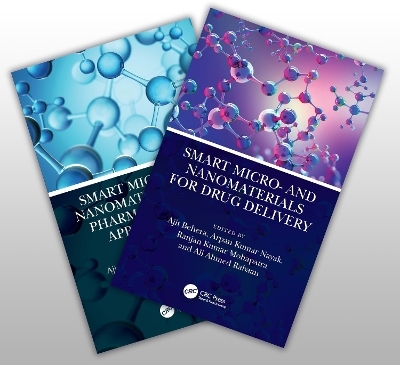
Smart Micro- and Nanomaterials for Drug Delivery and Pharmaceutical Applications, Two-Volume Set
CRC Press
978-1-032-55508-9 (ISBN)
- Titel z.Zt. nicht lieferbar
- Versandkostenfrei innerhalb Deutschlands
- Auch auf Rechnung
- Verfügbarkeit in der Filiale vor Ort prüfen
- Artikel merken
The application of clinical smart nanocarriers continues to be a fruitful and challenging field for both academic and clinical disciplines as well as industries. These clinically approved micro- and nanobased products have impacted treatment of numerous predominant diseases including cancer, diabetes, and different immune disorders. This Two-Volume Set presents a comprehensive overview of the most recent studies on smart micro- and nanomaterials with a focus on their smart activity for formation of targeted and responsive drug-delivery carriers and pharmaceutical applications.
Covers the global market perspective of micro- and nano-smart materials in pharmaceutical industries.
Discusses smart micro- and nanomaterials processing by polymers, metals, and other composites.
Describes all possible stimulated systems for drug delivery.
Details swellable polymers, multi-stimuli-responsive polymers, carbon nanotubes, quantum dots, and self-assembling peptide-based nanostructures.
Explains various processing routes and mechanisms for target release.
Addresses applications in oral drug delivery, anticancer agents, anti-tumor drug delivery, drugs for management of infection, and MEMS and diagnostics along with their future scope.
This wide-ranging reference work is written to support researchers in the fields of materials engineering and biotechnology with the goal of improving the diagnosis and treatment of disease and patient quality of life.
Ajit Behera is Assistant Professor in the Metallurgical & Materials Department at National Institute of Technology, Rourkela. He earned his PhD from IIT Kharagpur. Arpan Kumar Nayak is Research Professor in the Department of Energy Engineering, Konkuk University, Republic of Korea. He earned his PhD from IIT Kharagpur. Ranjan K. Mohapatra is Assistant Professor in Chemistry at Government College of Engineering, India. He earned PhD from Sambalpur University. Ali Ahmed Rabaan is Head of the Molecular Diagnostic Lab at Johns Hopkins Aramco Healthcare Dhahran, Saudi Arabia, where he is also is a member of the Emerging Infectious Diseases task force. Dr. Rabaan is also adjunct Assistant Professor at the College of Medicine, Alfaisal University, Riyadh, Saudi Arabia. He earned his PhD in Molecular Microbiology from University of Sheffield, United Kingdom.
Volume 1: Smart Micro- and Nanomaterials for Drug Delivery
Chapter 1: Introduction to smart materials in micro- and nano-scale
Chapter 2: Current approaches to smart drug delivery
Chapter 3: Polymer for smart drug delivery
Chapter 4: Metals for smart drug delivery
Chapter 5: Composite for smart drug delivery
Chapter 6: Micro- and nanoscale oral drug delivery platforms
Chapter 7: Smart nanocarriers
Chapter 8: Carbon nanotubes (CNTs) and their smartness
Chapter 9: Quantum dots (QDs) and their smartness
Chapter 10: Enzyme Responsive Micro/Nano Drug Delivery
Chapter 11: Thermo- responsive micro/nano drug delivery
Chapter 12: Light-triggered micro/nano drug delivery
Chapter 13: Electric field responsiveness of nano drug delivery
Chapter 14: Magnetic field responsive micro/nano drug delivery
Chapter 15: pH-responsive micro/nano drug delivery
Chapter 16: Adoption of smart materials for sustained and controlled drug release
Chapter 17: MEMS-based drug release
Chapter 18: Porous Nanocarries for Targeted Drug Delivery and Theranostics
Chapter 19: Prospects and future scope of smart drug delivery systems: a critical perspective
Volume 2: Smart Micro- and Nanomaterials for Pharmaceutical Applications
Chapter 1: Micro- and Nanoscale Oral Drugs Delivery System
Chapter 2: A perspective on the global market of micro and nano smart materials in pharmaceutical industries
Chapter 3: Processing of smart Micro and Nanomaterials for Pharmaceutical Applications
Chapter 4: Production of smart particles using microfluidic technology
Chapter 5: Release mechanism of Smart Drug Delivery
Chapter 6: Micro and nanoscale technologies in oral drug delivery
Chapter 7: Swellable polymers
Chapter 8: Diagnostic-sensing systems
Chapter 9: Stimuli-responsive hydrogels micro/nano drug delivery
Chapter 10: Magnetic nano carrier mediated site-specific delivery of anticancer agents: a promising strategy for targeted treatment of glioma
Chapter 11: Materials release and toxicity in micro- and nano-scale
Chapter 12: Adoption of smart materials for sustained and controlled drug release
Chapter 13: Biodegradable nanocarrier based topical drug delivery for effective management of vaginal infections: Recent progress and challenges ahead
Chapter 14: Smart nano-carriers and their advancement
Chapter 15: Self-assembling peptide-based nanostructures
Chapter 16: Nanoparticulate Enzymatic mechanism in anti-tumor drug delivery
Chapter 17: Stimuli-responsive block copolymers and polymer gels for Drug and gene delivery
| Erscheint lt. Verlag | 27.8.2024 |
|---|---|
| Reihe/Serie | Emerging Materials and Technologies |
| Zusatzinfo | 23 Tables, black and white; 46 Line drawings, black and white; 69 Halftones, black and white; 115 Illustrations, black and white |
| Verlagsort | London |
| Sprache | englisch |
| Maße | 156 x 234 mm |
| Gewicht | 1600 g |
| Themenwelt | Medizin / Pharmazie ► Physiotherapie / Ergotherapie ► Orthopädie |
| Technik ► Maschinenbau | |
| Technik ► Medizintechnik | |
| Technik ► Umwelttechnik / Biotechnologie | |
| ISBN-10 | 1-032-55508-4 / 1032555084 |
| ISBN-13 | 978-1-032-55508-9 / 9781032555089 |
| Zustand | Neuware |
| Informationen gemäß Produktsicherheitsverordnung (GPSR) | |
| Haben Sie eine Frage zum Produkt? |